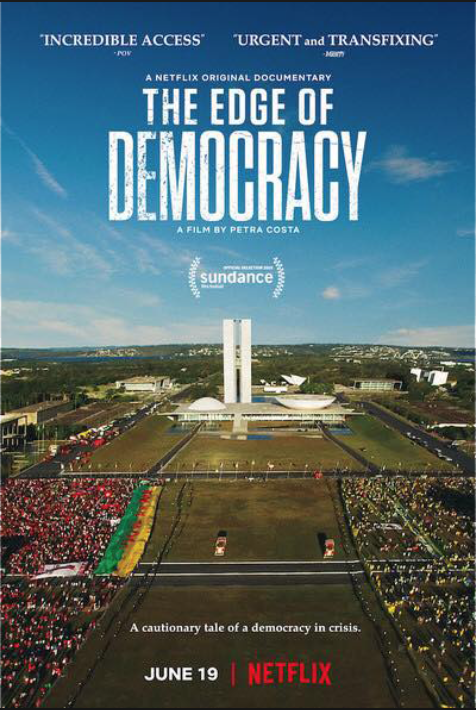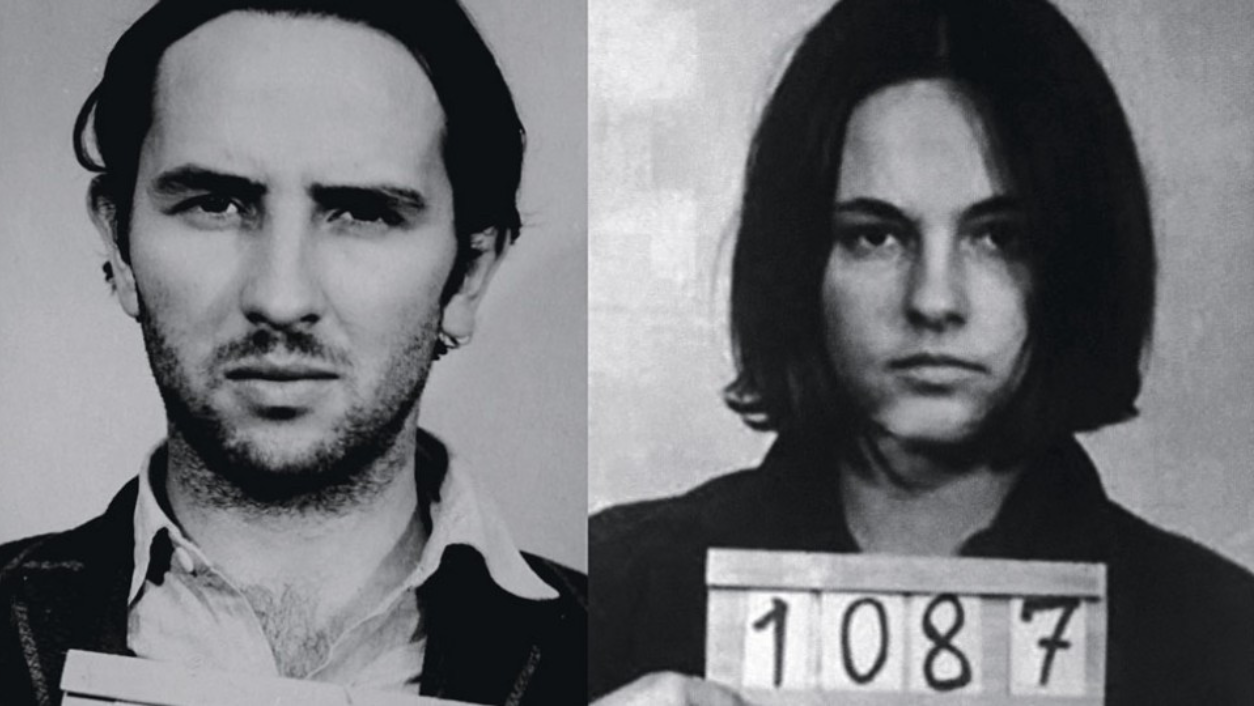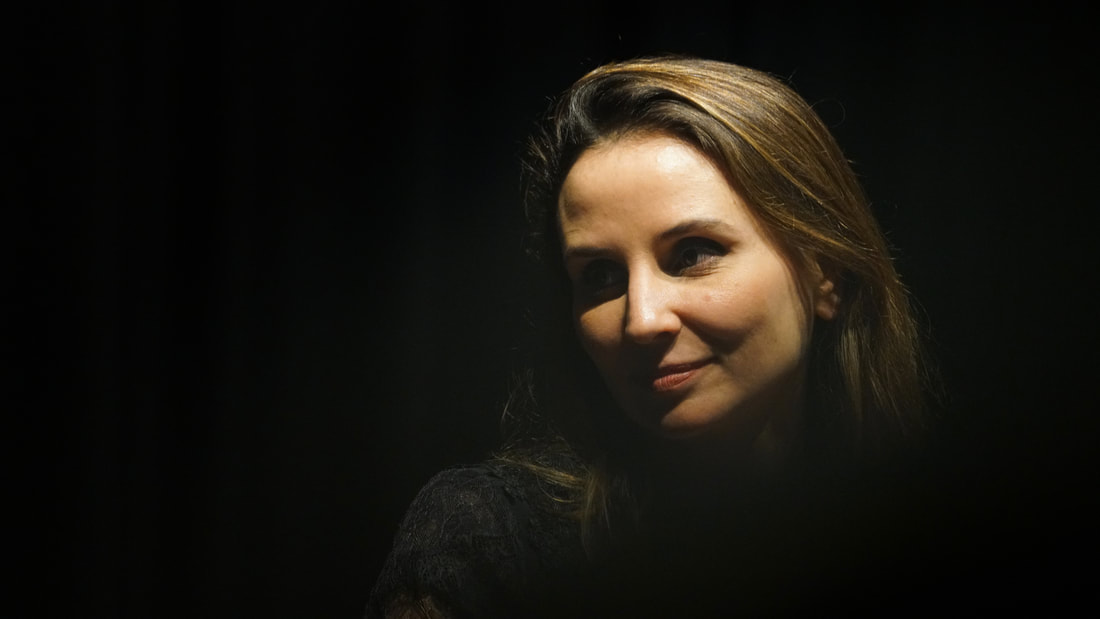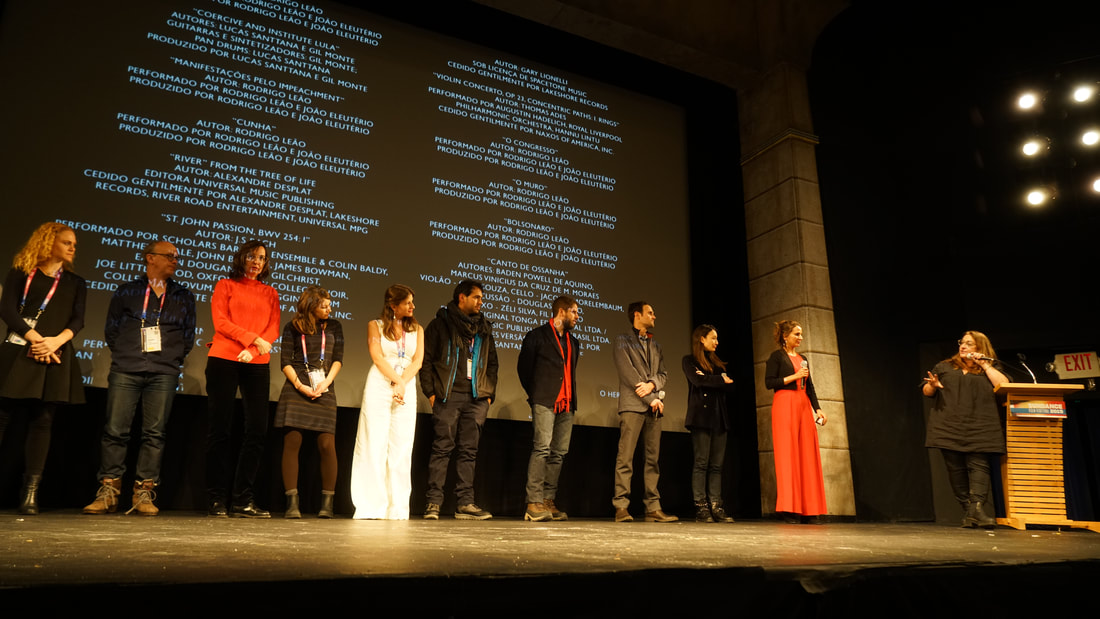|
Director Petra Costa and producer Joanna Natasegara on parallels to our U.S. political moment: 'Democracy is worth protecting' In 1969 director Costa-Gavras came out with his classic political thriller Z, a taut depiction of a life and death struggle for freedom in a country torn by left and far right. Fifty years later, Petra Costa has released The Edge of Democracy, a film that shares the pulsating dramatic tension of Z, except her movie is nonfiction. The documentary shows how the director's native Brazil has descended into something approaching political chaos, with the future of its democracy at stake. "Brazilian democracy and I are almost the same age. I thought that in our 30s we would both be standing on solid ground," Costa notes in voiceover in her film, now streaming on Netflix and playing in select theaters. She adds in a director's statement, "The Edge of Democracy captures my personal journey into politics as I watched my country fall into disarray, echoing the undoing of so many democracies around the world." What frightens me is that in a recent poll, 20-percent of Brazilians said they would prefer an authoritarian rule to democracy, so people are losing faith in democracy. Costa, 35, was born to parents for whom the fight for political freedoms meant everything. Her mother and father were arrested in the late 1960s for protesting the authoritarian government that took power after a military coup in 1964. They were imprisoned for a time and spent the 1970s in hiding, Costa tells Nonfictionfilm.com. "My parents dedicated most of their life fighting against the military dictatorship in Brazil," Costa says. "They -- together with hundreds of thousands of people -- managed to reestablish democracy." Mass demonstrations helped return the country to democratic rule in 1985. A succession of democratic elections followed and in 2002 Luiz Inácio Lula da Silva, the charismatic leader of the Workers Party, won the presidency. His mandate, in part, was to address gross economic inequality. "Brazil's one of the most unequal countries in the world and when Lula came to power about 300 children died per day of hunger and I grew up thinking that it was a tragic but unchangeable reality," Costa comments. "The fact that he managed to take Brazil -- him and his team -- out of the map of hunger, according to the UN, and about 20 million people rose out of misery and 20 million others out of poverty was just astounding." Lula left office January 1, 2011 with an approval rating well over 80-percent. His former chief of staff and hand-picked successor, Dilma Rousseff, won election to replace him. It was during Rousseff's time as president that Brazil's politics turned toxic. Rousseff's popularity remained high during most of her first term, despite the worldwide economic slowdown caused by the financial crisis 0f 2008. She won re-election in a hotly contested race in 2014, but her opponent, Aécio Neves, refused to accept the election results. "One of the first fundamental structures that guarantees a democracy is that opponents who lose recognize the victory of those who won," Costa observes. "That didn't happen in Brazil in 2014 and I think our democracy started to erode from there... When Dilma won the main opponent did not recognize her victory and coordinated an impeachment movement against her." The impeachment movement gained steam in 2016 after Rousseff was accused of fudging the nation's finances through an accounting mechanism. That created turmoil in the body politic, something Costa captures in her documentary. "I was quite surprised in 2016 when I went to the streets to film a protest and saw for the first time people asking for the return of the military," she reveals. "It was the first time I had ever seen that and I was really shocked, not just by that but also by the level of hatred I saw in the streets... I felt something was very wrong with Brazilian society." Lula da Silva, who had been barred from serving three consecutive terms as president, announced his intention to run for president again in 2018. It appeared he might win easily, returning the Workers Party to power, but a corruption investigation that had dogged Dilma also ensnared him. The UN Human Rights Committee urged Brazil to allow him to run despite the investigation, but a Brazilian court disqualified Lula. He was later sentenced to 12 years in prison, and the right-wing populist candidate Jair Bolsonaro was elected president in 2018. The rise and fall of certain politicians seemed to continuously converge with the interests of the financial elite. Costa sees the prosecution of Lula as politically-motivated. Her suspicions have been bolstered by recent reporting from Glenn Greenwald of The Intercept, who, drawing from "an enormous trove of secret documents," found "Brazil's top prosecutors who indicted Lula schemed in secret messages to prevent his party from winning [the] 2018 election." The director accepts the election result that made Bolsonaro president, but invalidating the candidacy of Lula hardly seems to have made for a fair electoral fight. "It was a democratic election... That's the main thing -- the opposition to Bolsonaro all recognized his victory," Costa says, but adds, "The most recent leak that Glenn Greenwald reported of WhatsApp messages between the judge and prosecutor that were responsible for Lula's case... reveal undemocratic things that happened in this election." Director Petra Costa and producer Joanna Natasegara at the Sundance Film FestivalExtreme polarization of the electorate, political feuding across social media and the alleged misuse of democratic institutions (i.e. the courts) for political purposes have weakened Brazil's grasp on democracy, Costa argues. The same thing is happening in the United States under President Trump, many would assert. During his campaign for president in 2016 Trump refused beforehand to accept the election results if Hillary Clinton won -- an unprecedented declaration.
Furthermore, since gaining office, Trump has repeatedly pressured the Justice Department, which is supposed to remain above the political fray, to investigate Clinton and to launch other politically-motivated investigations (into the FBI itself, for instance). And earlier this month, Trump told ABC's George Stephanopoulos he would listen if foreign governments approached him with dirt on his 2020 presidential rivals, and might not inform the FBI about it (the chair of the Federal Election Commission said accepting such information would be illegal). "It is very interesting to look at how fragile our democracies are and I think the team learned a lot about what we value during the making of the film," Oscar-winning producer Joanna Natasegara tells Nonfictionfilm.com. "We polarize more and more and that's not only in Brazil but in many other countries -- this idea that the left and right are getting further and further apart, and that in and of itself creates anti-democratic sentiment on both sides. I think what we as a team really agree on is that democracy is worth protecting and that you do that by protecting its institutions, not by protecting ideologies." Costa adds, "I really hope that the film can get us talking about what are fundamental values of democracy and what are the norms that need to be respected for democracy to thrive and the level of openness and dialogue that we all have to have for that to happen. I think for too long I took democracy for granted and my greatest learning process making this film is that I cannot do that anymore." |
AuthorMatthew Carey is a documentary filmmaker and journalist. His work has appeared on Deadline.com, CNN, CNN.com, TheWrap.com, NBCNews.com and in Documentary magazine. |
- Home
- News
- Videos
-
Galleries
- 2019 Tribeca Film Festival
- Full Frame Documentary Film Festival
- 2019 SXSW Film Festival
- SXSW 2018 Gallery
- 2019 Sundance Film Festival
- Outfest 2018 Photo Gallery
- Outfest 2017
- Sundance 2018 Photos
- 2017 LA Film Festival
- 2017 Cannes Film Festival
- Tribeca Film Festival 2017
- SXSW 2017 Gallery
- 2017 Berlin Film Festival
- Sundance 2017 Gallery
- 2016 Los Angeles Film Festival
- Cannes Film Festival 2016
- SXSW 2016 Gallery
- Berlinale 2016 Gallery
- Sundance 2016 Gallery
- Filmmaker Gallery
- About
- Contact
Proudly powered by Weebly
- Home
- News
- Videos
-
Galleries
- 2019 Tribeca Film Festival
- Full Frame Documentary Film Festival
- 2019 SXSW Film Festival
- SXSW 2018 Gallery
- 2019 Sundance Film Festival
- Outfest 2018 Photo Gallery
- Outfest 2017
- Sundance 2018 Photos
- 2017 LA Film Festival
- 2017 Cannes Film Festival
- Tribeca Film Festival 2017
- SXSW 2017 Gallery
- 2017 Berlin Film Festival
- Sundance 2017 Gallery
- 2016 Los Angeles Film Festival
- Cannes Film Festival 2016
- SXSW 2016 Gallery
- Berlinale 2016 Gallery
- Sundance 2016 Gallery
- Filmmaker Gallery
- About
- Contact






 RSS Feed
RSS Feed